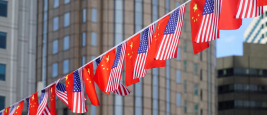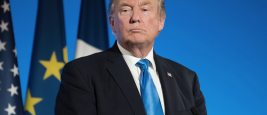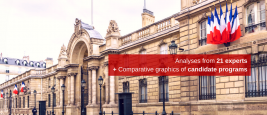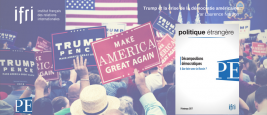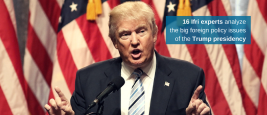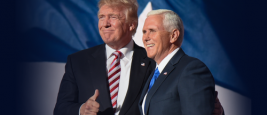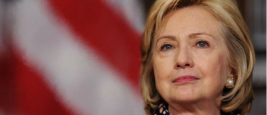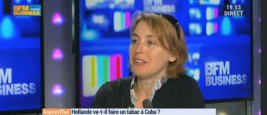
Laurence NARDON
Research Fellow, Head of Ifri's Americas Program
Research Interests:
- North American political systems and political philosophies
- U.S. foreign policy and transatlantic relations
- US trade policy evolutions and relations with China
Dr. Laurence Nardon heads the Ifri program on Americas. She edits and contributes to its collections of online research papers, such as the U.S.-focused Potomac Papers. Laurence is a member of the editorial board of the reviews "Politique étrangère" and "The Washington Quarterly". In association with Slate.fr and the newsletter "Time to Sign Off" (TTSO), she is the author of a weekly podcast on U.S. politics and policies called "New Deal" (formerly "Trump 2020"). It is available every Wednesday, in French.
Prior to joining Ifri, Laurence was a research fellow at the Ecole des Hautes Etudes en Sciences Sociales (EHESS), then a Visiting Fellow at the Center for Strategic and International Studies (CSIS) in Washington, DC from 2001 to 2003. Laurence Nardon holds a Ph.D. in political science from Université Paris-1 Panthéon-Sorbonne. She studied at the University of Kent at Canterbury after graduating from Institut d’Etudes Politiques de Paris. In the Fall of 2000, she was a Fulbright Scholar at The George Washington University in D.C.
The exploration of space and the use of digital tools and systems have in common to be quite recent in human history but to have changed the world, society and economy by connecting people and things, breaking down borders, and redistributing knowledge, power and control.
Chinese power continues to grow both militarily and economically: its disputed territorial gains in the South China Sea are complemented by its extensive investment initiative in the New Silk Roads through the Eurasian continent.
In the week following Trump’s election, Ifri published a study to identify the likely changes in U.S. foreign policy. From the outset, this election appeared as a change in the U.S.’ trajectory, with consequences on the power relations and functioning of the international system.
France’s current presidential campaign has created an unprecedented situation fuelled by revelations and a total absence of restraint, but it has not truly taken account of the disruptions of the last year: Brexit, the attempted coup in Turkey, the election of Donald Trump, the recapturing of...
Trump’s victory in the 2016 presidential election is an expression of the crisis of American democracy.
Like most “traditional” industries, for several years the space industry has been faced with the challenges of digital technology. So, the European space industry is dealing with new actors from digital technology, which are mainly American start-ups or Silicon Valley giants...
What will become of US foreign policy under Donald Trump? A selection of Ifri researchers has come together to offer their thoughts on this question. Our experts cover an array of topics through 14 contributions, ranging from the future Sino-American relations, through US engagement in the...
The announcement of Mike Pence as Republican presidential nominee Donald Trump’s running mate on July 15 was decidedly lackluster, if not downright awkward. Far from his normal persona of self-assurance to the point of hubris, Trump seemed uncomfortable and even nervous throughout, shifting...
Hillary Clinton, the frontrunner in the U.S. presidential election, has plans for American foreign policy. Clinton wants ISIS and Bashar Al-Assad out of Syria and to focus on human rights in trade negotiations with China. Now, Clinton and her campaign hope that voters will believe in her...
With the Democratic Presidential Nomination in sight, Hillary Clinton must still contend with a continuous conversation about her email practices. How will this scandal, or non-scandal, affect the presidential race yet to come? A look at the perspectives of the American constituency and ...
For Ifri's U.S. specialist, the Democratic presidential candidate's illness sheds a bright light not only on her health but also on her relationship to transparency.
The U.S. media and its links with politics.
Of the litany of mass shootings in the United States, the attack in Orlando has demanded attention because of its sheer scale.
Are the United States at risk of giving into a totalitarian drift embodied by Donald Trump?
More and more states are requiring voters to present an approved form of identification, a formality that primarily affects ethnic minorities.
Donald Trump, American presidential candidate: Where is the campaign? with Laurence Nardon, head of the United States program at the French Institute for Intenational Relations (IFRI).
...Anne Giudicelli, founder of TERR(o)RISC, Laurence Nardon, researcher and head of the United States program at IFRI, Benaouda Abdeddaïm, columnist at BFM Business and Romain Zerbib, strategic management researcher with IGS,...
Understand François Hollande's trip to Cuba with commentary by Daniela Ordonez, economist specializing in Spain, Portugal, Latin America and the Carribean at Euler Hermes; Benaouda Abdeddaim, economic editor of BMF Business; Laurence Nardon, researcher and United States...





